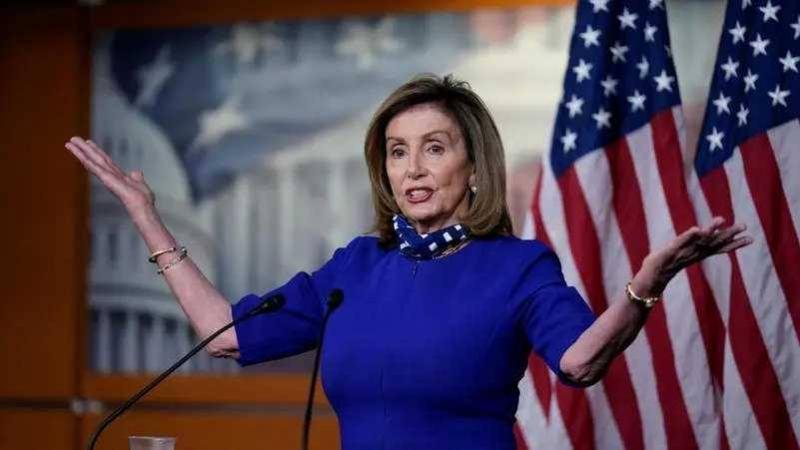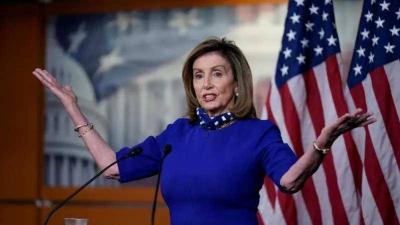A plane believed to be carrying U.S. House Speaker Nancy Pelosi arrived in Taiwan on Tuesday. Taiwanese media confirmed that "the air defense system at Taipei Airport has been activated." Meanwhile, Japanese broadcasting reported that "eight U.S. fighter jets took off from Okinawa Island, east of Taiwan."
China quickly announced the "closure of civil airspace over the Taiwan Strait," threatening that "any aircraft violating the no-fly zone in Taiwan's airspace may be shot down." In the same context, Chinese media reported that "Chinese Su-35 fighter jets crossed the Taiwan Strait."
Pelosi left Malaysia, the second stop on her Asian tour, earlier that day amid rising tensions over the Taiwan visit. A global flight tracking site indicated that nearly 300,000 users were tracking a U.S. Air Force plane believed to be carrying Pelosi, according to Bloomberg, although there was no evidence or confirmation that Pelosi was aboard this plane.
Chinese media reported that the military deployed a large number of military vehicles off the coast of Taiwan.
Pelosi commented at the Taiwanese airport that her visit to Taiwan "does not contradict U.S. long-standing policy" toward China. She noted that "discussions with Taiwanese leaders will focus on affirming support for our partner and enhancing our shared interests, as well as strengthening the security and stability of the Indo-Pacific region." Pelosi emphasized that "U.S. solidarity with the Taiwanese people is more important today than ever." She stated that her visit to Taipei "confirms Washington's steadfast commitment to supporting Taiwan's democracy" and reminded that Washington should remember its pledge to "support Taiwan's defense as its democracy faces significant threats, and the United States will continue to oppose unilateral attempts to change the status quo in Taiwan."
Taiwan, in response to Pelosi's visit, stated: "We warmly welcome foreign guests, and we will make appropriate arrangements," while Taiwanese media reported that the Taipei Airport received bomb threats ahead of Pelosi's anticipated visit. Previously, Taiwan's Ministry of Defense confirmed military movements near Taiwan, asserting: "We will deploy appropriate military forces in response to threats... We are determined and capable of ensuring our national security." Major Taiwanese newspapers such as United Daily News, Liberty Times, and China Times cited anonymous sources saying that Pelosi would head to Taipei and spend Wednesday night there after visiting Malaysia.
China's Ministry of Foreign Affairs commented on Pelosi's visit to Taiwan, saying: "We hope the U.S. understands the sensitivity of the situation... We will respond firmly if Pelosi visits Taiwan." Military Watch magazine reported that China deployed a "carrier-killer missile," the first hypersonic glide vehicle, after the U.S. Navy moved its carrier groups close to Chinese territory due to concerns over Beijing's reaction to Pelosi's visit to Taiwan.
U.S. Secretary of State Antony Blinken stated that Pelosi is the one to decide whether to visit Taiwan, and that China should not escalate the situation following that visit. Politico reported that European nations are preparing for the possible implications of serious escalation between Washington and Beijing due to Pelosi's visit. An insider informed the magazine that the deteriorating war of words between the United States and China regarding Taiwan raises concerns among European nations about the risks of a potential military escalation. Sources confirmed that the EU views any military confrontation between China and Washington as an uncontrollable conflict. Munich Security Conference Vice President Boris Rohde warned European countries to be unprepared for a U.S.-China confrontation by supporting Taiwan, while also maintaining close communication with Beijing to ease tensions.
Meanwhile, China vowed to launch "targeted military actions" in response to Speaker Nancy Pelosi's visit to Taiwan, amid rising tensions between Washington and Beijing, according to Agence France-Presse.
Chinese Defense Ministry spokesperson Wu Qian condemned the visit in a statement, saying: "The Chinese People's Liberation Army is on high alert and will carry out targeted military operations in response, firmly defending national sovereignty and territorial integrity, and thwarting external interference and attempts at Taiwan separatism."
John Kirby, the National Security Council Coordinator for Strategic Communications at the White House, confirmed that Washington will closely monitor the situation in Asia during Pelosi's visit to Taiwan and will make efforts to ensure her safety. Kirby, commenting on Pelosi's visit despite formal condemnation from Beijing, stated, "We will certainly be monitoring developments closely. We see no reason for this visit to escalate into a crisis or conflict, or to become a pretext for potential Chinese military action." According to him, U.S. leadership is concerned about the possibility of such developments. He added, "At the same time, I assure that we see no reason for this visit to provoke conflict. There are no changes in our policy regarding Taiwan, and we will continue to monitor developments. We will also do our utmost to secure a peaceful and safe visit for Pelosi."




